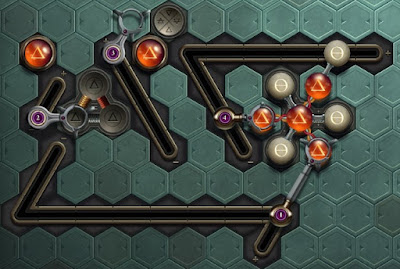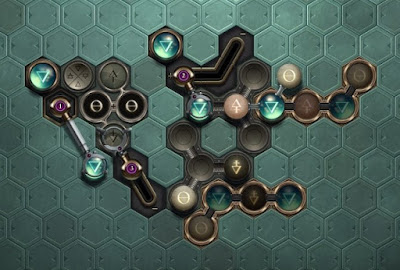Opus Magnum – Adventures in Alchemy, Bondage and Depression
By Casey Douglass
When I slip into
depression, I find certain video games quite useful. Some provide the
kind of gentle absorption that gives me a slight break from myself,
others offer me the capacity to be aimless in a fun way for little
while. Zachtronics’ alchemy puzzle game Opus Magnum falls
into the first category, a game that I thought I might find
frustrating, but that has actually become the “mind food” game
that I nibble at every morning. This post will look at some of the
ways that I feel Opus Magnum helps me with my mental state, so
if you are looking for a review, you'll have to find one elsewhere
I’m afraid.
Anyone familiar with
Zachtronics’ games will know that some of them are incredibly
difficult. Even the “easier” ones can become quite complicated
before you know it. If that wasn’t enough, they usually include a
community-based “How Well You Did” screen after each puzzle,
showing how the efficiency or speed of your design compares with
others who’ve completed the same puzzle. It’s quite likely, if
there was one, that your solution would place you in the “Holy
Shit! What did you do?” category. At least after your first attempt
anyway.
This might all sound
like a bit of a nightmare for someone in the throes of depression.
Not only do you get the stress of trying to solve the puzzle, you
most likely will also have some urges towards perfectionism, and the
prospect of some competition from a faceless community that will only
increase your feelings of inadequacy doesn’t sound like much fun
does it!
Unless, that is, you
approach things in a more measured way, a way that might also help
your thinking with regards to non-digital pursuits in other areas of
your life.
Just Solve The Blinkin’ Puzzle!
I said something like
this to myself at one point, when I’d caught myself dilly dallying
about where to put a few of the components in my latest alchemical
machine. It does cut to the root of the thing though. At base, I
needed to solve the puzzle. The “how” didn’t matter, the beauty
of the device was immaterial, the efficiency... well, who cares if it
takes ten times longer than the design of someone else? Opus
Magnum doesn’t put restrictions on how many gizmos you use or
how long the machine takes to perform its function, so your first
attempt can be a massive, slow monstrosity, and still produce the
outcome you need. Also, and this is quite important, you can’t
refine a solution to a problem unless you have something to refine.
How many other things
does this approach apply to? A good many. A prime example is a writer
who doesn’t write that first draft because they want it to be
perfect from the beginning. If you don’t give yourself permission
to experiment and fail, you aren’t going to get very far,
particularly with any work that involves creativity. It really is
pointless to worry about refinements to something when the “thing”
hasn’t even been created. It’s a little like worrying about your
car’s first year service... before you’ve even decided which car
to buy, let alone bought the thing.
Break It Down
Opus Magnum has
the player creating various products by way of alchemical agents,
such as the elements (air, water, etc.), salt and lead. By
manipulating these with various arms, converters and bond-creators (Aha! This is the bondage I mentioned in the title, sorry if your naughty thoughts led you to expect something more... leathery!) and breakers, you need to get the correct layout and bonds into place
before the output section will count it as being made. Some of the
patterns are quite intricate, so looking carefully at what is
required can often make things less daunting.
I found a good way to
approach this was to first drag the mechanisms that I knew I would
need into place. Need to create salt from an element? You need one of
those converter pad things. Need to create bonds in a kind of “Y on
it’s side” pattern? There’s a gizmo for that too. Just having
the tools out in the work area helped me to drill down into what was
required. Then I experimented.
I would often try to
make a certain part of the design, and if things went wrong, I’d do
what I could to get around them. That pivoting grabber can’t quite
reach the thing I need it to after those other things are bonded...
Hmm, I'll make it an extendable one, or I'll put it on a track that
will allow it to move. I guess I created additional problems trying
to solve the original one. I then solved those and eventually solved
the larger design issue. After feeling pleased with myself for
solving the thing, I then had these “self-created” problems in
mind when it came to refining my design later.
 |
| This design needed a triple-twisted bond pattern on the orange elements. Yep, it was a pain in the backside. |
Being able to
methodically work through something, solving the little hiccups that
emerge along the way, is something that seems quite alien when your
brain is in depressed mode. Some things in non-gaming life have no
solution, others might, but they might require things that you just
don’t have, can’t do, or have any hope of achieving. Being able
to experience a tiny version of the satisfaction that problem solving
can bring feels nice. It might be a bit of a tease with regards to
“Why can’t I solve all of my problems in this way?” sentiments,
but I'll take it for now.
My brain is tired, my
thoughts are self-critical, and I feel a bit muddled about what I
wanted to say with this post and how long it’s taking me to say it. I’m going to go away and rest/reflect for awhile. I'll come back
to this another day.
Small Bites
It does no good to
smash your brain against a problem for too long without a break. I’ve
been dipping into Opus Magnum for maybe 20 mins at a time,
often just once a day. It’s enough time to progress a design and
feel nearer to the solution. Even if all I manage to achieve in one
session is another couple of atoms bonded to a design in the correct
place, it’s enough to keep my mind interested and to generate a
small feeling of competence. Competence is something that I don’t
often feel, so again, a “lite” version of the feeling to show
that I still have brain circuits that can bring the feeling about, is
very welcome.
I recently reviewed abook about Kaizen, a system that utilises the doing of tiny actions
to get big results. The “only adding one extra atom” to my
alchemical machine goal allowed me to take the pressure off myself
and, over the days that followed, would eventually see the design
complete. The comparison with writing is again, easy to make. People
suffering with writer’s block are often told to just write a
little, maybe one sentence per day. They are free to write more, but
they are also free to go and do something else after that one
sentence has been written. Over time, even if only one sentence is
completed each day, eventually they will have written a short story
or article, or given even more time, a book. As someone who easily
suffers from overwhelm, I like this approach very much indeed. The
notion of behavioural activation is at play here, that doing the
thing might not initially be fun, but finding satisfaction from doing
it, over time, helps you to feel like doing it a bit more, and maybe
even finding some mastery in the thing that you are doing.
 |
| One of the machines I created. It's not that efficient but it gets the job done. |
Lead into Gold
I guess that’s what I
like about Opus Magnum. The thought processes that I have to
go through to overcome the puzzles are ones in which I can see the
parallels with other areas of life. When you are feeling depressed,
fatigued and ready to give up on life, even the smallest things seem
impossible. The manner of breaking things down into even smaller
steps, and taking little bits of action on these, is probably one of
the most useful ways to edge yourself towards things that you value.
Having the freedom to do this is what Opus Magnum grants the player, and is one of the reasons that I’ve seen it
described as being one of the most accessible Zachtronics titles. If
there was a strict “Achieve this in ten cycles” style failure
state, I think I might have bounced off Opus Magnum
after an hour or two. As it stands, I keep going back to it to get a
small taste of those mental states that seem so scarce in my
non-gaming life. Maybe one day I'll feel satisfaction over something
more than solving a puzzle in a game. Until then, I’ve got elements
to bond.
Post
Script: I originally thought that this piece would be
finished and up on my site before now, but my mood and health
imploded again. The irony of a piece about depression being held up
by depression isn’t lost on me. Maybe I should write something
about sex or wealth, so that said article could be held up by
something more pleasurable. The whole time I was tinkering with this
post, my mind has been yelling at me as to “What’s the point?”
and “It’s not worth it!” Even today, the day I’ve published
it, I admit that I still feel that way. I decided to post it, and I
did, so that is what I am getting from this, the knowledge that I
followed through with it and got it posted up. I guess that’s a win
but it doesn’t feel like anything right now, which is a numbness
that is one of my closest companions most of the time. Anyway, thanks
for reading, and if you've found any particular games good for mood, please let me know below in the comments or find me on social media :).

